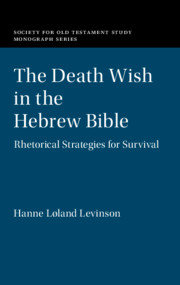Book contents
- The Death Wish in the Hebrew Bible
- Society for Old Testament Study Monographs
- The Death Wish in the Hebrew Bible
- Copyright page
- Dedication
- Contents
- Preface
- Acknowledgments
- Abbreviations
- 1 Introduction
- 2 Death Wish as Negotiation Strategy
- 3 Death Wish in Despair and Anger
- 4 Wishing Away One’s Birth
- 5 Death Wishes as Wishful Thinking
- 6 Wishing for Death or Fighting for Life?
- Bibliography
- Author Index
- Index of Scripture and Other Sources
- Index of Hebrew Words and Phrases
- Subject Index
5 - Death Wishes as Wishful Thinking
Published online by Cambridge University Press: 10 September 2021
- The Death Wish in the Hebrew Bible
- Society for Old Testament Study Monographs
- The Death Wish in the Hebrew Bible
- Copyright page
- Dedication
- Contents
- Preface
- Acknowledgments
- Abbreviations
- 1 Introduction
- 2 Death Wish as Negotiation Strategy
- 3 Death Wish in Despair and Anger
- 4 Wishing Away One’s Birth
- 5 Death Wishes as Wishful Thinking
- 6 Wishing for Death or Fighting for Life?
- Bibliography
- Author Index
- Index of Scripture and Other Sources
- Index of Hebrew Words and Phrases
- Subject Index
Summary
“The Israelites said to them, ‘If only we had died by the hand of YHWH in the land of Egypt, when we sat by the fleshpots and ate our fill of bread; for you have brought us out into this wilderness to kill this whole assembly with hunger’” (Exod 16:3). In this chapter, we will look at the so-called death wishes as wishful thinking, the fourth of the death-wish categories. The label wishful thinking points to one characteristic these wishes share: they cannot be fulfilled. This is simply because they are wishes about the past, and history cannot be changed. The wishes in this category also share vocabulary, as they are introduced either by מי־יתן or by לוּ (also occurring in the form לוּא), both of which are often translated as “if” or “if only.” The death wishes as wishful thinking do not all share the same rhetorical function, and thus this category differs from the categories discussed in previous chapters (where each category had one rhetorical function). We find wishful thinking connected with death in three contexts in the Hebrew Bible. The first context is the wilderness, already mentioned, where the people on several occasions say, “If only we had died” (Exod 16:3; Num 14:2; 20:3). Within this subcategory, the wishes seem to share the same rhetorical function, as we will see shortly. The second place where we find a death wish as wishful thinking is in the context of mourning. Here, we only have one explicit example, the narrative of King David mourning his son Absalom. In this narrative, David says, “If only I had died instead of you” (2 Sam 19:1 [18:33 ET]). The third context brings us back to the book of Job, where we find the “if only” formulations in two of Job’s death wishes (Job 6:8–9; 14:13); these texts will not be discussed here. Another difference between this final category and the preceding chapters is that I will not be studying these texts in as much depth as those already covered, because the death wishes as wishful thinking serve a more limited rhetorical function here than do those discussed previously.
- Type
- Chapter
- Information
- The Death Wish in the Hebrew BibleRhetorical Strategies for Survival, pp. 119 - 139Publisher: Cambridge University PressPrint publication year: 2021

